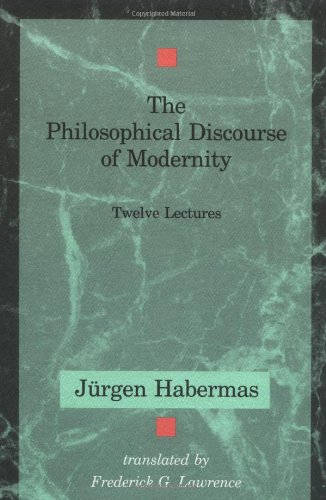The Philosophical Discourse of Modernity download
Par horton scott le mercredi, juillet 6 2016, 22:11 - Lien permanent
The Philosophical Discourse of Modernity. Frederick Lawrence, Jurgen Habermas, Thomas McCarthy

The.Philosophical.Discourse.of.Modernity.pdf
ISBN: 0745608303,9780745608303 | 456 pages | 12 Mb

The Philosophical Discourse of Modernity Frederick Lawrence, Jurgen Habermas, Thomas McCarthy
Publisher: Polity Press
Rewriting the soul: Multiple personality and the sciences of memory. About RVP IVA.26 Contemporary philosophical discourse in Lithuania, Lithuanian Philosophical Studies; IV. An attempt at a reevaluation of Neo-Kantianism, on the contrary, is to be found in Jiirgen Habermas, The Philosophical Discourse of Modernity, trans. Lawrence (Cambridge, Mass: MIT Press, 1987). Heidegger has no objection to such a rational framework if it is understood clearly to be a technical means (it is perhaps this distinction that Habermas occults in 'Philosophical Discourse of Modernity'). Most importantly, he has changed our discourse from Marx and the "factory" to Foucault and the "prison". Much better to follow Habermas, who in the Philosophical Discourses of Modernity endeavors to engage in conversation with the great thinkers he assays. This perspective is precisely part of a discourse of modernity that is established in the 19th century in the wake of the Industrial Revolution and becomes dominant in the USA after the Scopes trial in the 1920s. Scientific reasoning does not sit easily with the presuppositions of any religion, and the work of Enlightenment philosophers made the belief in God appear irrational…It is easy to imagine Mohammed Atta, at Hamburg . As an example of this contrast, I refer to the famous critique against Foucault leveled by Habermas in The Philosophical Discourse of Modernity: Twelve Lectures (Habermas, 1987). Jurgan Habermas, “The Entwinement of Myth and Enlightenment: Max Horkheimer and Theodor Adorno,” in The Philosophical Discourse of Modernity: Twelve Lectures, Cambridge: MIT Press, 1987, pp. Since the 1960s the Frankfurt School has been guided by Jürgen Habermas' (born 1929) work on communicative reason, linguistic intersubjectivity and what Habermas calls “the philosophical discourse of modernity“. Philosophical Discourse of Modernity. The Philosophical Discourse of Modernity: Twelve Lectures, trans. The philosophical discourse of modernity. There is some useful discussion on Gary's site about Habermas' twelve lectures on the philosophical discourse of Modernity. <>The obvious starting point for the analysis of the Habermas – Derrida debate is Habermas' 1987 book The Philosophical Discourse of Modernity in which one 'lecture' and one 'excurses' deal with Derrida. This is a general introduction to Habermas' post 1981 magnum opus Theory of Communicative Action social and political philosophy. "Labor and Interaction: Remarks on Hegel's Jena Philosophy of Mind. For short accounts relevant for the present purpose, see Habermas, Jurgen, The Philosophical Discourse of Modernity, translated by Frederick G.